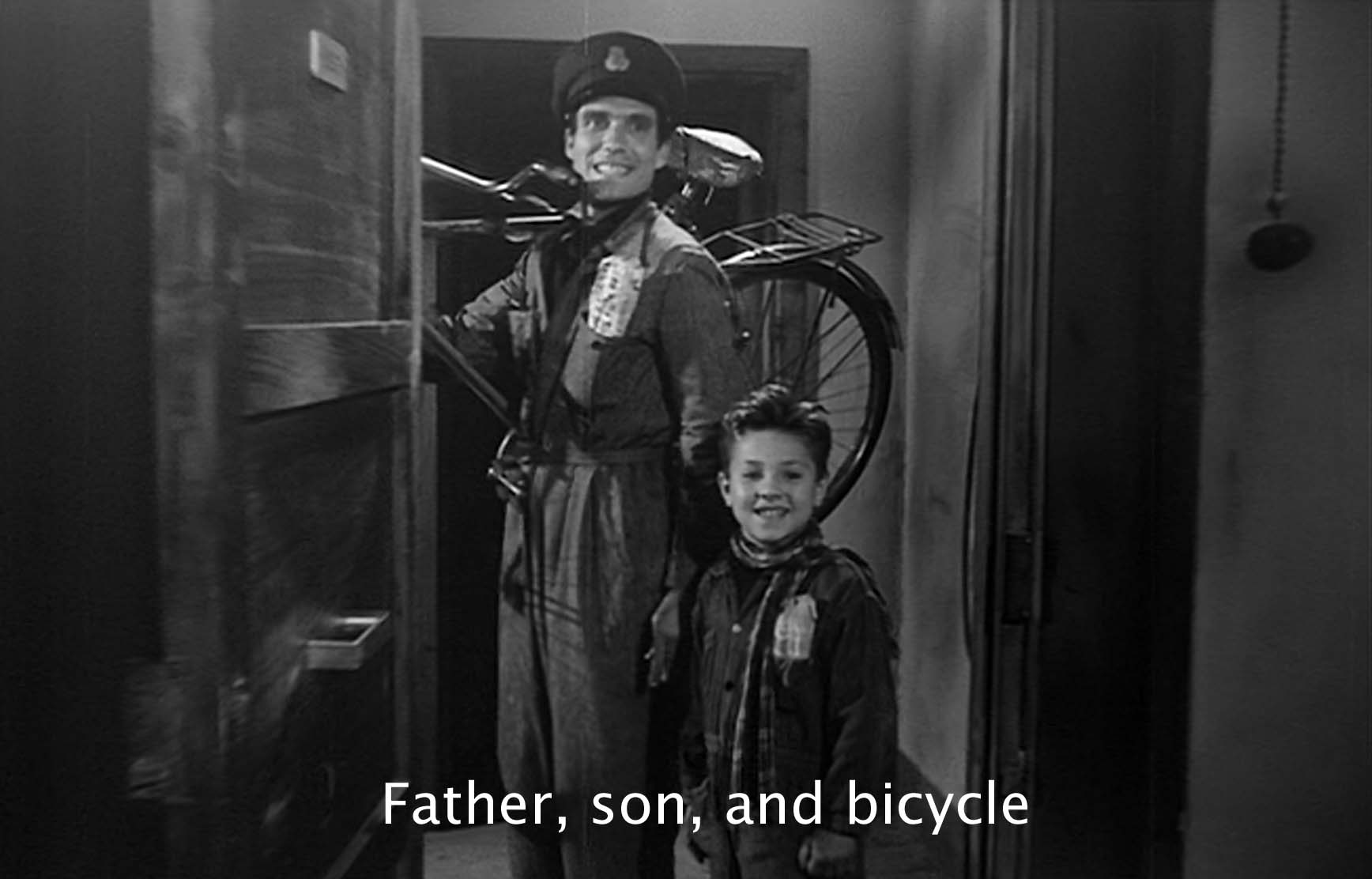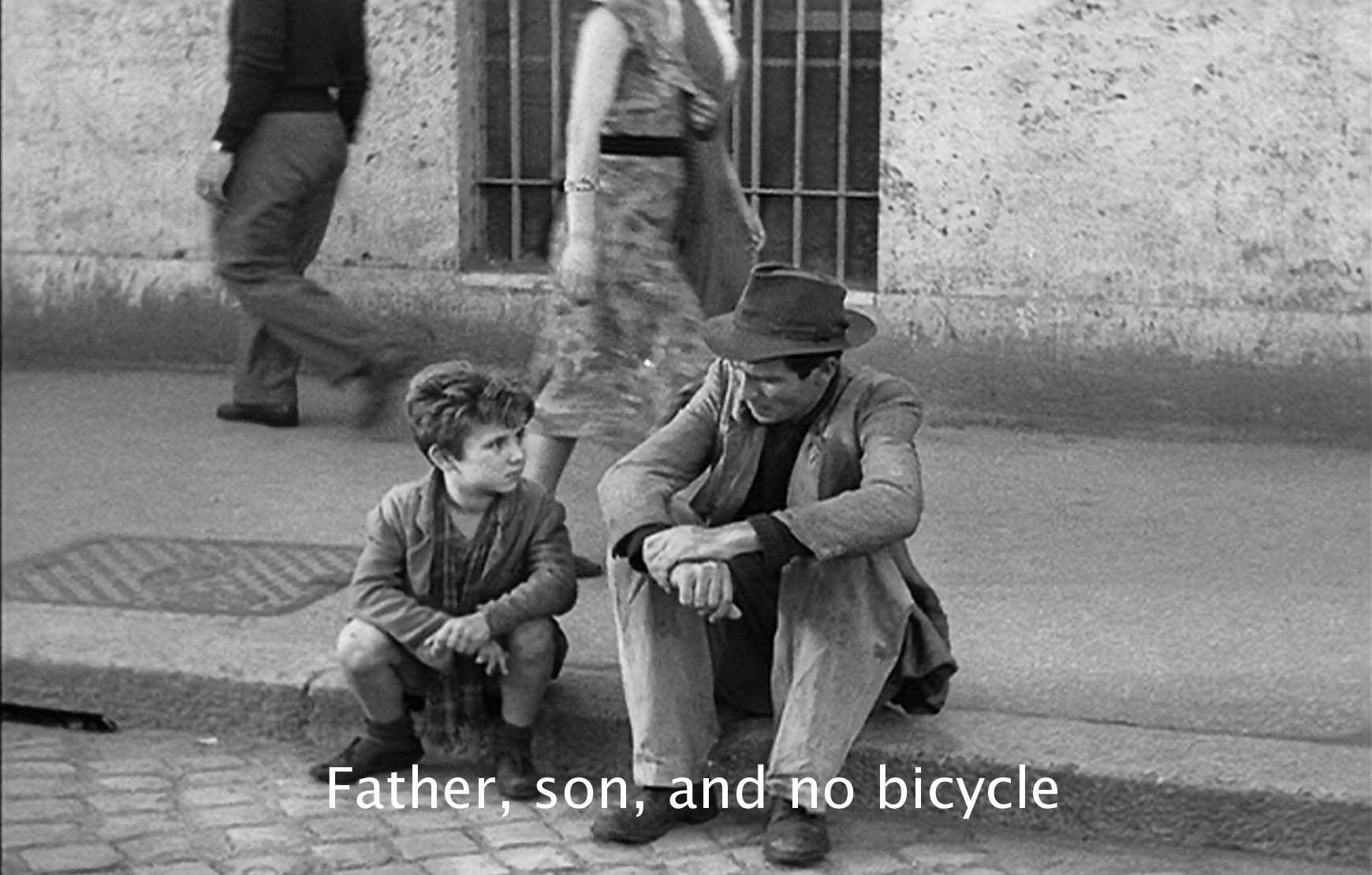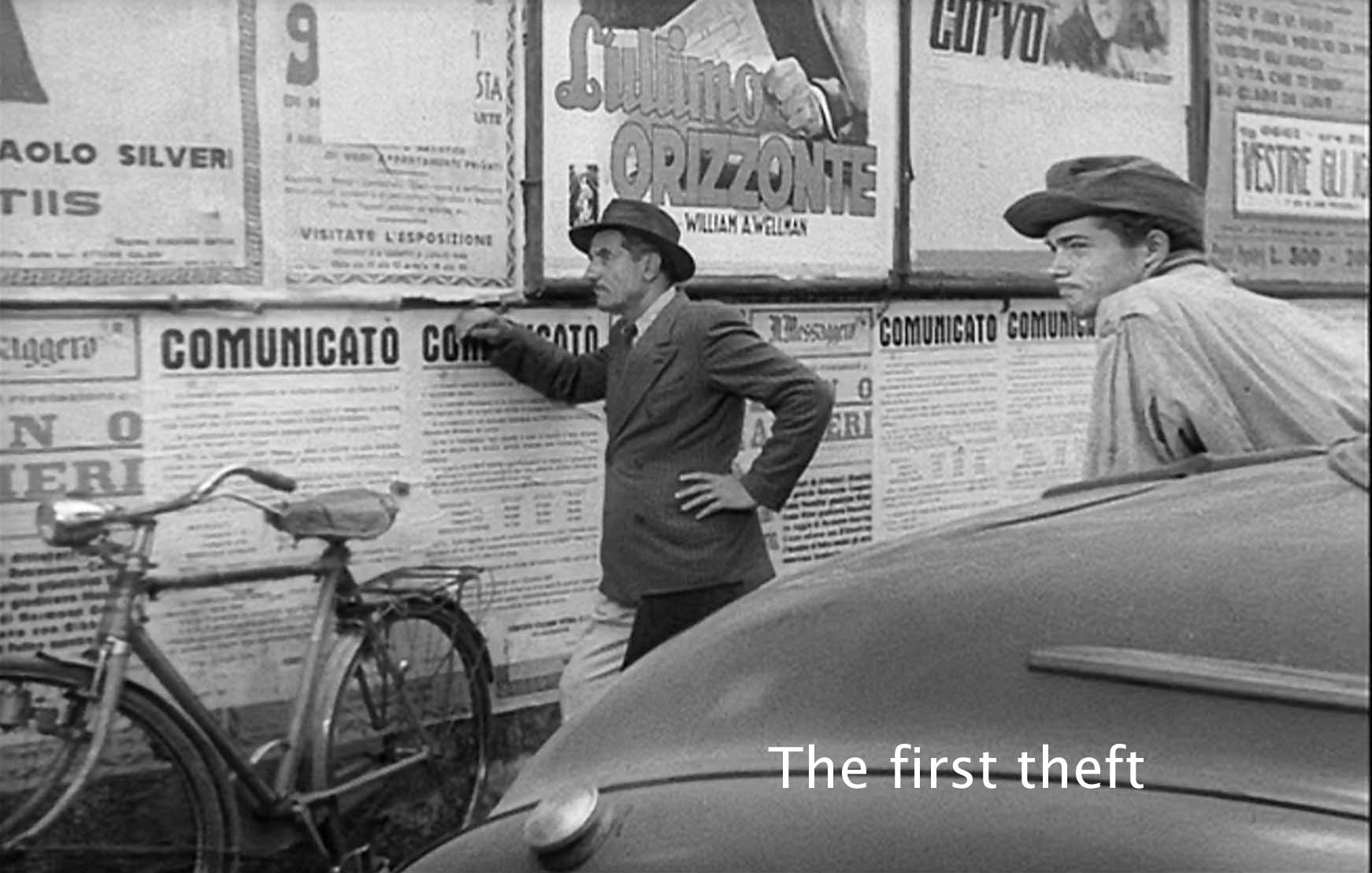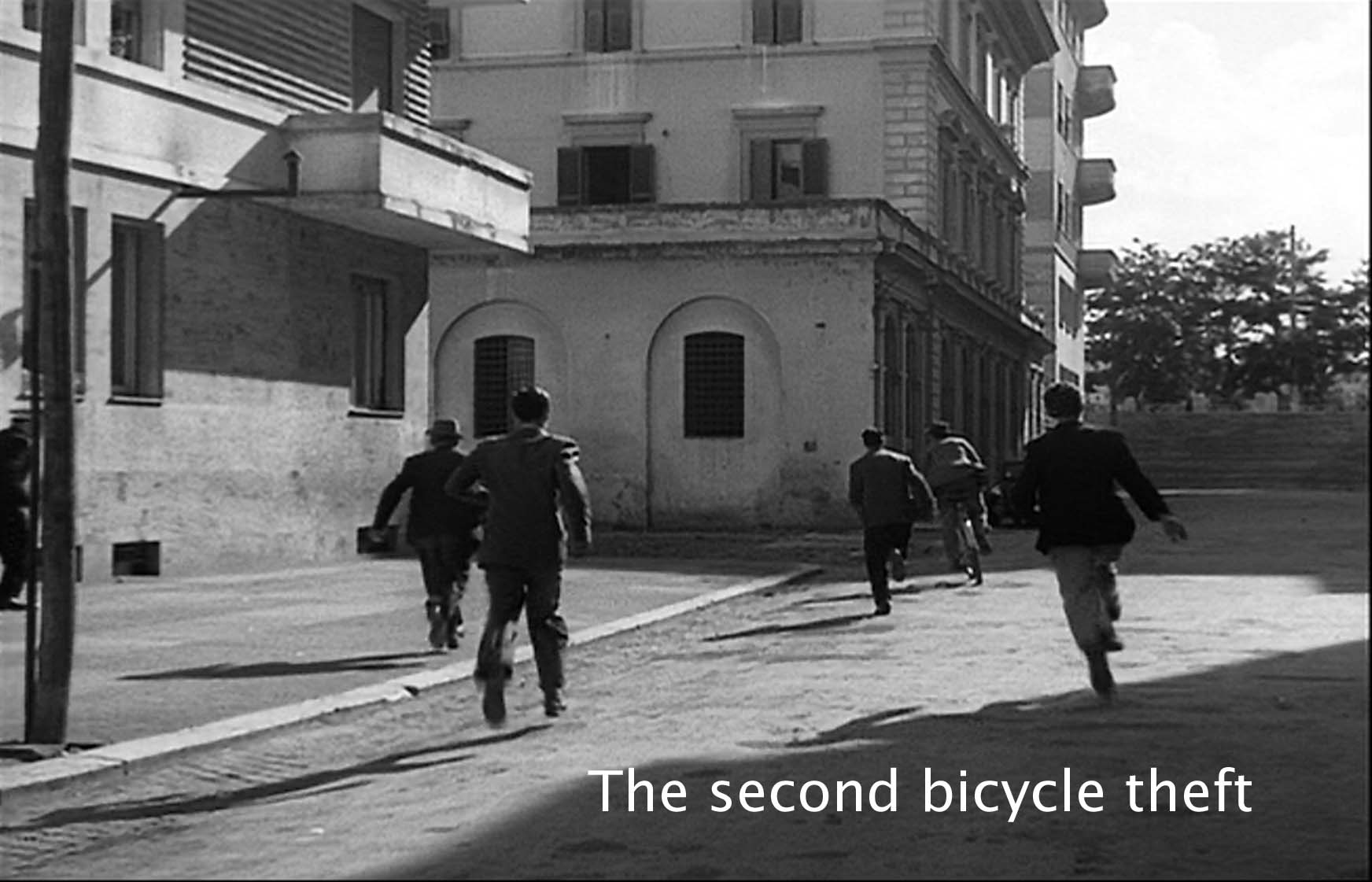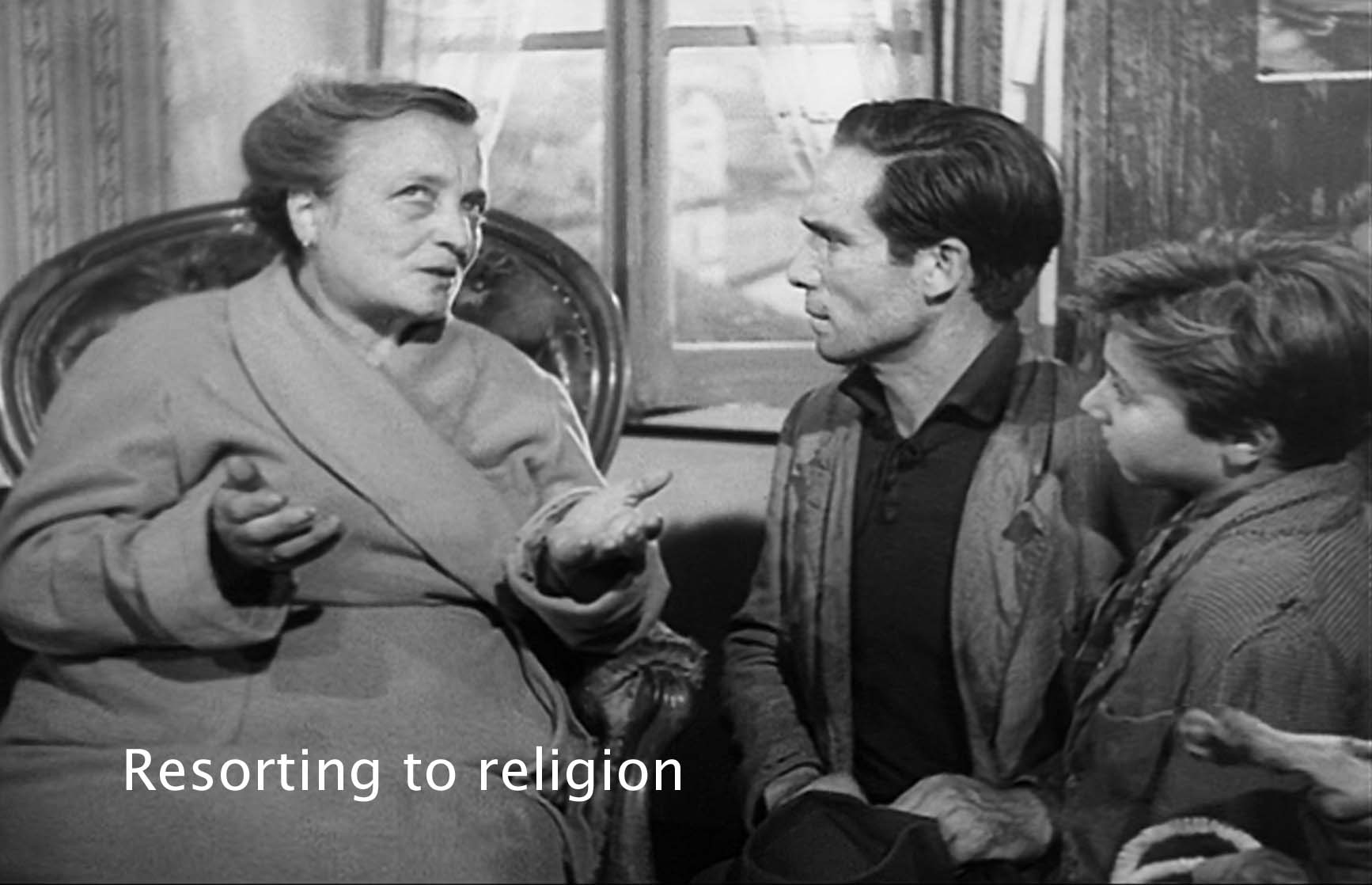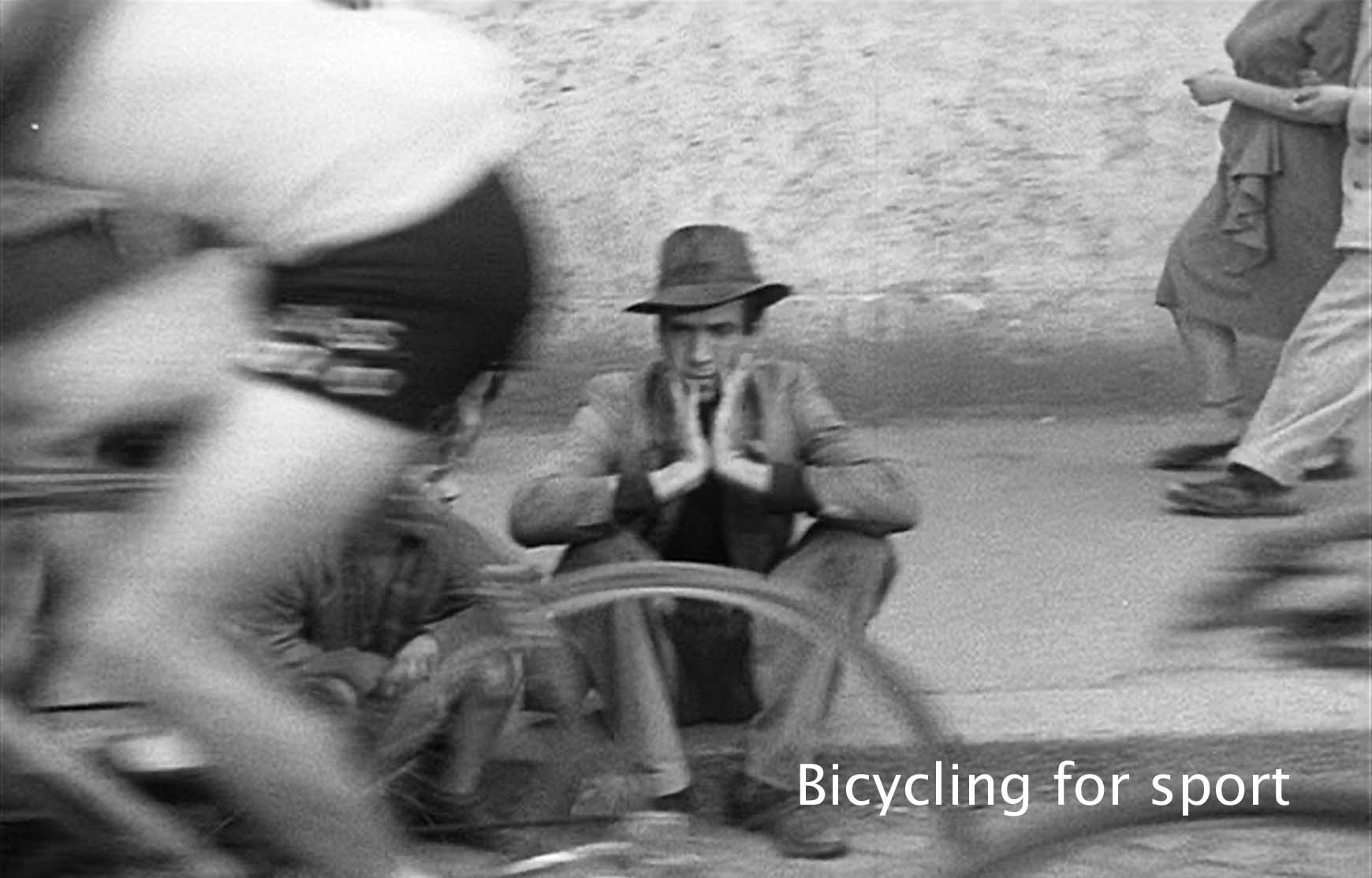Bicycle Thieves is a “city film.” Indeed as Geoffrey Cheshire argues in an essay accompanying the Criterion DVD, “Bicycle Thieves is one of cinema’s great ‘city films’.”
The city film that comes right away to my mind is Jules Dassin’s Naked City, no doubt because I grew up in the “naked city” itself, New York. Perhaps that is why I think of the city as the essence of human civilization, rural life as an aberration.
Be that as it may, it is part of the glory of cities to produce crowds and crowds of people. Bicycle Thieves is very much a movie of crowds. Throughout, we see crowds of people on the streets and busses and trolleys filled with people.
Consider (as always!) the opening and closing sequences. In the opening a crowd of men seeking jobs follow a bus carrying a paper-pushing official at a job center. (Apparently, the workers’ union provides the jobs, for later we find the same functionary in the crowd at the union hall.) The opening sequence singles out our hero, Antonio or “Anto” (Lamberto Maggiorani). The first word I can hear on the sound track is his name, Ricci. And Ricci, singled out, is given a job, one that requires a bicycle.
In the final scene, he (and his son, the engaging Bruno (Enzo Staoia), now totally defeated, melt back into a crowd. In other words, the film begins by bringing Antonio out as an individual and ends by submerging his individuality back into the anonymous crowd of city-dwellers.
Antonio’s defeats and to his successes follow a similar pattern. Consider his successes.
- He gets the paper giving him a job when he is an individual.
- He gets the job itself when he faces a boss one-on-one.
- He gets a little extra money for the family bedsheets when he and his wife (Lianella Carell), two people, face the one-person pawnbroker.
- At the end, he is forgiven his stealing a bicycle when he and the owner are face to face, and the owner relents (perhaps prompted by little Bruno’s grief and fear).
In short, his few plusses come when he faces his opponents one-on-one or when someone is with him and he can outnumber them.
Conversely, his defeats come when he himself is outnumbered. That is why it is important to recognize that it is two people who steal his bicycle. The boy steals the bike, and the man delays and misdirects the pursuit. Two against one. (De Sica thought this episode important enough to use six cameras to film it.)
Incidentally, the bicycle itself becomes a symbol for this relationship between the one and the many. It is one and entire. It is contrasted to the hundreds or thousands of bicycle parts in the two flea markets. Its brand name, “Fides” means faith or trust in Latin.
When Antonio himself steals a bicycle (becoming one of the Ladri di biciclette), he is alone and quickly outnumbered. But throughout the movie, Antononio is outnumbered: when a roomful of policemen dismiss his problem; the useless speeches, show, and suggestions at the union hall; the many sellers at the flea markets; the flea markets themselves with hundreds of bicycles and bicycle parts as against the one Antonio wants; the crowd at the church that interferes with his trying to get information from the old man; the neighborhood crowd that thwarts his capture of the thief; and finally the crowd that captures him when he himself has become a “bicycle thief.”
In episode after episode, Antonio loses when he is outnumbered. I take it this reflects the vigorous Marxism of De Sica’s gifted screen writer, Cesare Zavattini, and probably De Sica’s own politics. The individual cannot win against the larger forces of society. Those forces will make him a thief or starve him. The film foreshadows his transformation when, twice, he cuts into lines of waiting people, once at a bus stop, once at the fortune-teller’s. At the bus stop the man he cut in front of loses his place and misses the bus. Poverty and desperation turn people into thieves.
The real thievery, however, is class, the disparity between rich and poor. De Sica gives us obvious symbols of the depravity of the rich: the upper-class man blowing bubbles(!) in the flea market followed by the upper-class pedophile who tries to pick up Bruno. There is the nasty little rich boy in the restaurant with his fancy dessert looking over at Bruno, the poor boy with no dessert. There are the rich people dispensing charity at the church, another crowd interfering with Antonio’s desperate search. Just before Antonio’s thieving, fancy cars almost run down Bruno.
Associated with the forces that defeat Antonio are various kinds of fiction or fantasy. He is putting up a poster of Rita Hayworth in Gilda when his bicycle is stolen. There are shows in the restaurant and in the rehearsal at the union hall. There, the singer repeats the word gente, people, as if to emphasize De Sica’s theme of the many against the one. In an interestingly reflexive dialogue, the driver of a garbage truck complains that it rains every Sunday (his one day off). He has nowhere to go but the movies, and movies bore him. (Reality suddenly intrudes as he nearly runs down a pedestrian.)
Other fantasies involve religion: the church people who will help crowds but not the individual; the fortune-teller who gets her insights from God. When the owner of the bicycle that Antonio steals forgives him, a spectator says he should thank God. A crowd of priests jabbers in German, fascinating Bruno with this incomprehensible language. The tangle of wrought iron outside the fortune-teller’s door is echoed later by a medusa-gate outside the brothel. Religion in this movie means mystification or whoring.
However, as if to rewrite Marx’s claim that religion is the opiate of the masses, De Sica gives us four different references to sports in contrast to the real world of work and poverty. There are the hundreds of bicycles that he sees outside the sports stadium just before he himself steals one. There are the cheers for the “Forza Modena” team, but more bitingly, the men riding bicycles for sport. The radio playing a sportscast outside the fortune-teller’s links sports to fantasy and falsity.
They are all many: the rich, the purveyors of Hollywood fantasy, the religious people and their deluded clients, or the sports fans. They are crowds and multitudes. Antonio is just one against those crowds.
This is a city film: the individual among and against the many. When I think of Bicycle Thieves that way, I can’t help applying the curtain line from Naked City: “There are eight million stories in the Naked City; this has been one of them.” So here, but where the Hollywood director chose an individualistic and melodramatic story of murder, the neo-realistic Marxists De Sica and Zavattini created the story of an ordinary man facing social forces bigger than he can cope with, forces that grind him down, forces embodied in the crowds that defeat him. The one facing the many. Which is truer to the human condition?
